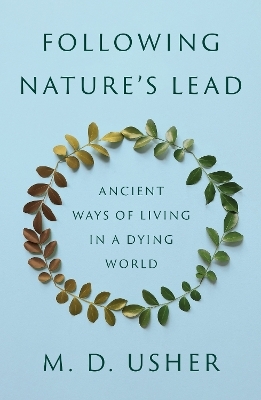
Following Nature’s Lead
Ancient Ways of Living in a Dying World
Seiten
2025
Princeton University Press (Verlag)
978-0-691-24920-9 (ISBN)
Princeton University Press (Verlag)
978-0-691-24920-9 (ISBN)
- Noch nicht erschienen (ca. Mai 2025)
- Versandkostenfrei innerhalb Deutschlands
- Auch auf Rechnung
- Verfügbarkeit in der Filiale vor Ort prüfen
- Artikel merken
In the spirit of E. F. Schumacher’s Small Is Beautiful, a dazzling and revelatory exploration of what ancient ideas and ways of living can teach us about creating a more sustainable world
How should we think and live in a world facing environmental catastrophe? In this urgent, original, and wide-ranging book, classicist and farmer M. D. Usher brings together ancient, indigenous, and modern ideas about how to live in this world and describes how we might begin to reconnect with Nature and heal our damaged planet and lives. The ancients were close to Nature, the source of their survival, in ways that most of us can scarcely conceive of today, and ancient philosophy often argues that humans should follow Nature’s lead. Usher makes the case that Nature’s resilience can serve as a model for our own responses to climate trauma and all the other harms caused by modern lifestyles.
Drawing on philosophy, science, economics, art, literature, history, and religion, Following Nature’s Lead is both an indictment of human overreach and a celebration of human ingenuity and the adaptability of Nature. Here, Plato meets German biologist Jakob von Uexküll, Lucretius illuminates King Lear, and Diogenes the Cynic crosses swords with Henry Thoreau.
Filled with vital and inspiring insights, Following Nature’s Lead shows how the ancients can help teach us to live in accordance with Nature—and why it’s essential for human survival that we learn to do so without delay.
How should we think and live in a world facing environmental catastrophe? In this urgent, original, and wide-ranging book, classicist and farmer M. D. Usher brings together ancient, indigenous, and modern ideas about how to live in this world and describes how we might begin to reconnect with Nature and heal our damaged planet and lives. The ancients were close to Nature, the source of their survival, in ways that most of us can scarcely conceive of today, and ancient philosophy often argues that humans should follow Nature’s lead. Usher makes the case that Nature’s resilience can serve as a model for our own responses to climate trauma and all the other harms caused by modern lifestyles.
Drawing on philosophy, science, economics, art, literature, history, and religion, Following Nature’s Lead is both an indictment of human overreach and a celebration of human ingenuity and the adaptability of Nature. Here, Plato meets German biologist Jakob von Uexküll, Lucretius illuminates King Lear, and Diogenes the Cynic crosses swords with Henry Thoreau.
Filled with vital and inspiring insights, Following Nature’s Lead shows how the ancients can help teach us to live in accordance with Nature—and why it’s essential for human survival that we learn to do so without delay.
M. D. Usher is the Lyman-Roberts Professor of Classical Languages and Literature and a member of the Department of Geography and Geosciences, the Environmental Program, and the Food Systems Graduate Program at the University of Vermont. His books include Plato’s Pigs & Other Ruminations: Ancient Guides to Living with Nature and three books in Princeton’s Ancient Wisdom for Modern Readers series, including How to Care about Animals and How to Be a Farmer. Usher and his wife own and operate a farm in Shoreham, Vermont.
| Erscheint lt. Verlag | 13.5.2025 |
|---|---|
| Zusatzinfo | 21 b/w illus. |
| Verlagsort | New Jersey |
| Sprache | englisch |
| Maße | 133 x 203 mm |
| Themenwelt | Geisteswissenschaften ► Philosophie ► Ethik |
| Geisteswissenschaften ► Philosophie ► Philosophie Altertum / Antike | |
| Naturwissenschaften ► Biologie ► Ökologie / Naturschutz | |
| ISBN-10 | 0-691-24920-2 / 0691249202 |
| ISBN-13 | 978-0-691-24920-9 / 9780691249209 |
| Zustand | Neuware |
| Haben Sie eine Frage zum Produkt? |
Mehr entdecken
aus dem Bereich
aus dem Bereich
unsere kollektive Verantwortung
Buch | Hardcover (2023)
wbg Theiss in Wissenschaftliche Buchgesellschaft (WBG) (Verlag)
35,00 €


